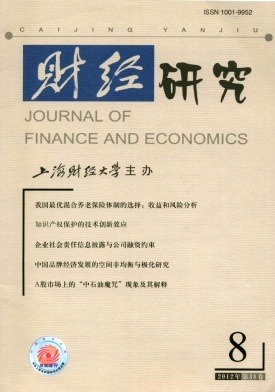上市公司经营业务分布是否影响盈余质量?——基于上市公司及其整体子公司相对业务规模的考察
财经研究 2012 年 第 38 卷第 08 期, 页码:73 - 84
摘要
参考文献
摘要
文章以2000-2009年我国A股上市公司为样本,以上市公司的整体子公司经营业务占集团业务的比重衡量子公司相对业务规模,考察"一控多"集团型上市公司的经营业务在母子公司上下级法人间的分布对上市公司整体盈余质量的影响。研究发现,子公司业务规模与公司整体盈余质量呈显著的负相关关系。具体而言,子公司业务规模越大,则公司整体的盈余管理程度越高、盈余反应系数越小。进一步的研究表明,母公司在集团中整体的控制水平能够显著降低子公司业务规模对盈余质量的负向影响。
[1]薄仙慧,吴联生.国有控股与机构投资者的治理效应:盈余管理视角[J].经济研究,2009,(2):81-91.
[2]胡奕明,唐松莲.独立董事与上市公司盈余信息质量[J].管理世界,2008,(9):149-160.
[3]沈玉清,戚务君,曾勇.审计任期、公司治理与盈余质量[J].审计研究,2009,(2):50-56.
[4]夏立军.盈余管理计量模型在中国股票市场的应用研究[J].中国会计与财务研究,2003,(2):94-122.
[5]徐浩萍,陈超.会计盈余质量、新股定价与长期绩效———来自中国IPO市场发行制度改革后的证据[J].管理世界,2009,(8):25-38.
[6]张雁翎,陈涛.盈余管理计量模型效力的实证研究[J].数理统计与管理,2007,(3):481-488.
[7]郑国坚.基于效率观和掏空观的关联交易与盈余质量关系研究[J].会计研究,2009,(10):68-76.
[8]Bartov E,Gul F,Tsui J.Discretionary-accruals models and audit qualification[J].Journal of Accounting and Economics,2000,30:421-452.
[9]Caramanis C,Lennox C.Audit effort and earnings management[J].Journal of Account-ing and Economics,2008,45:116-138.
[10]Cohen D,Zarowin P.Accrual-based and real earnings management activities around seasoned equity offerings[J].Journal of Acccounting and Economics,2010,50(1):2-19.
[11]Dechow P,Sloan R,Sweeney A.Detecting earnings management[J].The Accounting Review,1995,70:193-225.
[12]Dechow P,Ge W,Schrand C.Understanding earnings quality:A review of proxies,their determinants and their consequences[J].Journal of Accounting and Economics,2010,50(2-3):344-401.
[13]Givoly D,Hayn C,Katz S.Does public ownership of equity improve earnings quality?[J].The Accounting Review,2010,85(1):195-225.
[14]Gow I,Ormazabal G,Taylor D.Correcting for cross-sectional and time-series depend-ence in accounting research[J].The Accounting Review,2010,85:483-512.
[15]Gul F,Fung S,Jaggi B.Earnings quality:Some evidence on the role of auditor tenure and auditors’industry expertise[J].Journal of Accounting and Economics,2009,47:265-287.
[16]Jaggi B,Leung S,Gul F.Family control,board independence and earnings manage-ment:Evidence based on Hong Kong firms[J].Journal of Accounting and Public Policy,2009,28(4):281-300.
[17]Jiraporn P,Kim Y,Mathur I.Does corporate diversification exacerbate or mitigate earnings management?An empirical analysis[J].International Review of Financial Analysis,2008,17:1087-1109.
[18]Jones J.Earnings management during import relief investigations[J].Journal of Ac-counting Research,1991,29:193-228.
[19]Keung E,Lin Z,Shin M.Does the stock market see a zero or small positive earnings surprise as a red flag?[J].Journal of Accounting Research,2010,48(1):91-121.
[20]Kothari S,Leone J,Wasley C.Performance matched discretionary accrual measures[J].Journal of Accounting and Economics,2005,39:163-197.
[21]Scharfstein D,Stein J.The dark side of internal capital market:Divisional rent-seeking and inefficient investment[J].Journal of Finance,2000,55:2537-2564.
[22]Schipper K.Commentary on earnings management[J].Accounting Horizons,1989,3:91-102.
[2]胡奕明,唐松莲.独立董事与上市公司盈余信息质量[J].管理世界,2008,(9):149-160.
[3]沈玉清,戚务君,曾勇.审计任期、公司治理与盈余质量[J].审计研究,2009,(2):50-56.
[4]夏立军.盈余管理计量模型在中国股票市场的应用研究[J].中国会计与财务研究,2003,(2):94-122.
[5]徐浩萍,陈超.会计盈余质量、新股定价与长期绩效———来自中国IPO市场发行制度改革后的证据[J].管理世界,2009,(8):25-38.
[6]张雁翎,陈涛.盈余管理计量模型效力的实证研究[J].数理统计与管理,2007,(3):481-488.
[7]郑国坚.基于效率观和掏空观的关联交易与盈余质量关系研究[J].会计研究,2009,(10):68-76.
[8]Bartov E,Gul F,Tsui J.Discretionary-accruals models and audit qualification[J].Journal of Accounting and Economics,2000,30:421-452.
[9]Caramanis C,Lennox C.Audit effort and earnings management[J].Journal of Account-ing and Economics,2008,45:116-138.
[10]Cohen D,Zarowin P.Accrual-based and real earnings management activities around seasoned equity offerings[J].Journal of Acccounting and Economics,2010,50(1):2-19.
[11]Dechow P,Sloan R,Sweeney A.Detecting earnings management[J].The Accounting Review,1995,70:193-225.
[12]Dechow P,Ge W,Schrand C.Understanding earnings quality:A review of proxies,their determinants and their consequences[J].Journal of Accounting and Economics,2010,50(2-3):344-401.
[13]Givoly D,Hayn C,Katz S.Does public ownership of equity improve earnings quality?[J].The Accounting Review,2010,85(1):195-225.
[14]Gow I,Ormazabal G,Taylor D.Correcting for cross-sectional and time-series depend-ence in accounting research[J].The Accounting Review,2010,85:483-512.
[15]Gul F,Fung S,Jaggi B.Earnings quality:Some evidence on the role of auditor tenure and auditors’industry expertise[J].Journal of Accounting and Economics,2009,47:265-287.
[16]Jaggi B,Leung S,Gul F.Family control,board independence and earnings manage-ment:Evidence based on Hong Kong firms[J].Journal of Accounting and Public Policy,2009,28(4):281-300.
[17]Jiraporn P,Kim Y,Mathur I.Does corporate diversification exacerbate or mitigate earnings management?An empirical analysis[J].International Review of Financial Analysis,2008,17:1087-1109.
[18]Jones J.Earnings management during import relief investigations[J].Journal of Ac-counting Research,1991,29:193-228.
[19]Keung E,Lin Z,Shin M.Does the stock market see a zero or small positive earnings surprise as a red flag?[J].Journal of Accounting Research,2010,48(1):91-121.
[20]Kothari S,Leone J,Wasley C.Performance matched discretionary accrual measures[J].Journal of Accounting and Economics,2005,39:163-197.
[21]Scharfstein D,Stein J.The dark side of internal capital market:Divisional rent-seeking and inefficient investment[J].Journal of Finance,2000,55:2537-2564.
[22]Schipper K.Commentary on earnings management[J].Accounting Horizons,1989,3:91-102.
引用本文
张会丽, 陆正飞. 上市公司经营业务分布是否影响盈余质量?——基于上市公司及其整体子公司相对业务规模的考察[J]. 财经研究, 2012, 38(8): 73–84.
导出参考文献,格式为:





 7444
7444  4111
4111

